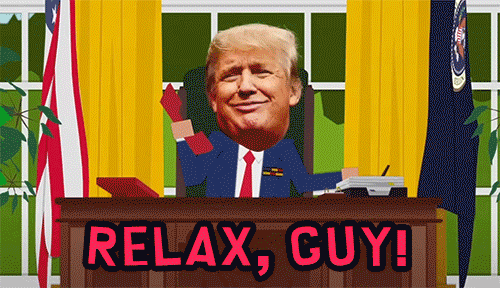About THAT South Park episode
The First Amendment’s funniest defenders declare war on the extortion-industrial complex
In law school, way back in the late 90s, South Park was appointment-viewing — and while it's had a lot of great moments over the decades, this may be their finest hour.
In the Season 27 premiere, “Sermon on the ‘Mount,” creators Trey Parker and Matt Stone delivered what might be the single most furious, funny, and fearless twenty-two minutes of satire aired in this decade. And they did it on Paramount’s dime, just days after inking a $1.5 billion deal with the studio.
It’s really, really worth watching, but here’s a quick rundown:
Cartman, suicidal over the end of “woke,” wonders who he’s supposed to mock in a post-woke world; even PC Principal has rebranded himself as “Power Christian Principal.” The Satan/Saddam relationship from the movie is back — but now, Trump is in the role of Saddam. (Worried it won’t work? “Relax, guy!”) Jesus shows up to warn the town’s protesting citizens not to “end up like Colbert.” And all of it is triggered by the fictionalized version of a very real, and very disturbing, legal settlement between Donald Trump and Paramount Global over the editing of a 60 Minutes interview with Kamala Harris.
The satire hits like a truck because it’s barely satire. It’s a comic strip version of reality — just slightly louder and a lot more naked.
As is their wont, Parker and Stone aren’t pulling punches. As of now, neither Trump nor the FCC has publicly threatened legal action against South Park or Paramount in retaliation for the episode — but the fact that we’re holding our breath to see if they do should tell you everything about the climate we’re living in. No legal threat has been issued — yet. But it’s not for lack of precedent.
Paramount should not have settled Trump’s lawsuit
Let’s revisit the non-fiction version. Trump filed a $10 billion lawsuit (later amended to $20 billion) against Paramount, claiming that a short edit in Kamala Harris’s 60 Minutes interview “confused and misled” the public in an attempt to swing the election. FIRE’s chief counsel Bob Corn-Revere described the edit:
During the interview, 60 Minutes correspondent Bill Whitaker asked then-Vice President Harris a question about the Biden administration’s relationship with Israeli Prime Minister Benjamin Netanyahu…
CBS broadcast two excerpts of Harris’ answer on two separate programs: On Face the Nation, CBS aired the first sentence of Harris’ answer. On 60 Minutes, CBS aired the last sentence of the answer. Really — that’s all this is about.
Admittedly, broadcasting what could seem like two different responses to the same question wasn’t necessarily a great decision in the middle of a hotly contested political campaign, but it’s absolutely within the power of journalists to edit their work. And they do it for our comprehension, usually, because most people don’t speak in perfect sound bytes. (If you want to see an extreme example, watch an athlete’s press conference after a game, and then compare that to the parts included in news coverage of the event.)
Legal experts across the spectrum dismissed the claim. So what did Paramount do?
They paid Trump $16 million. And that wasn’t the worst part.
They also agreed to:
Require 60 Minutes to release transcripts of interviews with all future presidential candidates;
Install an ombudsman at CBS to review complaints of “bias or other concerns” — which would be the most concerning part of the settlement, if not for their commitment to…
Run a reported $15 to $20 million worth of “PSA advertisements and other broadcast transmissions that support conservative causes supported by President Trump” (!) on CBS, thanks to an alleged side deal with a third party.
More about that side deal. Reportedly, Skydance’s David Ellison reached a deal independently with Trump’s team to offer the PSAs, assuming Skydance took control of the network. Those funds (again, reportedly) would be “supplied by Ellison,” son of billionaire Oracle founder Larry Ellison.
Paramount, for its part, denied any knowledge of such a deal. Trump himself has since insisted his deal with Paramount is really worth $36 million when you factor in “advertising.”
So Skydance wants to acquire Paramount, which requires FCC approval. Paramount is being sued by Trump. Skydance chief Ellison reportedly agrees to run pro-Trump content on networks owned by Paramount, once acquired. The lawsuit settles, and two days later, the merger is approved.
To quote our friend Bob Corn-Revere, “A cold wind just blew through every newsroom this morning.” That wasn’t a breeze. That was a warning.
The rise of the extortion-industrial complex
Also noteworthy is that the FCC still has a pending “news distortion” investigation into CBS’ handling of the Harris interview. The news distortion rule, left on the books after the Fairness Doctrine was sunsetted, prohibits broadcasters from “deliberately intend[ing] to mislead viewers or listeners” with a news report.
Under FCC Chairman Brendan Carr, a Trump loyalist, the agency is slowly rebuilding the machinery necessary to leverage government power over editorial content. Along with the news distortion rule, Carr has suggested the “public interest” standard should be reinterpreted to allow local stations to break rules imposed by national networks. As FIRE legal director Will Creeley observed, it was less than a year ago that Carr said the FCC couldn’t be “the nation’s speech police.”
And yet, here we are.
Taken together, Paramount seems to be experiencing what FIRE staffer Tyler Tone has called the extortion-industrial complex: a blurry mix of lawsuits, regulatory threats, and merger approvals that allow powerful political actors to punish disfavored speech without ever passing a single law. You don’t need to censor when you can chill, after all. (For his part, Tyler is sure he’s heard the term somewhere before, but since we can’t find it we’ll credit the coinage to him for now.)
Companies like Comcast, Verizon, and Disney were already pressured into gutting their DEI programs. Even mentioning diversity in programming is now seen as ideologically risky. The FCC has even reopened content investigations into ABC, NBC, and CBS over laughably weak complaints.
The Paramount case is different because it tied all of this together into a coherent system: a politically motivated lawsuit, regulatory leverage from a federal agency, and non-monetary concessions that directly alter editorial behavior. It’s the dream scenario for any would-be strongman: state-sanctioned speech control without the pesky optics of state control.
Trump’s strongman tendencies aren’t limited to broadcasters
It seems like the president never met a criticism he wouldn’t sue over. He recently sued The Wall Street Journal for reporting on his alleged 2003 birthday note to Jeffrey Epstein. The reporting was carefully attributed and seems journalistically appropriate. So of course, it had to be sued.
Closer to home for FIRE, Trump also went after Iowa pollster J. Ann Selzer, whose polling predicted Harris taking the lead in Iowa in 2024. Selzer's poll predicted Harris would win Iowa by three points; Trump would carry the state by 13. (At least two factors in the discrepancy are that landline-based phone polls don’t have the same reach because people have shifted to mobile phones, and that Trump supporters in general are less likely to respond to polls.) Trump is suing Selzer under Iowa law, alleging that his later victory in the state means Selzer’s poll constituted “consumer fraud.” We’re defending her, because trying to chill the reporting of unfavorable poll results is a direct assault on the First Amendment.
And it’s not just the press or polling. Law firms and universities have been put in the crosshairs of these pressure campaigns. This is what authoritarianism looks like when it’s wearing a business suit and holding a regulatory approval stamp.
So can we still take a joke?
If you’ve seen our 2016 documentary Can We Take a Joke?, you know we’ve been talking about the special role of comedy in a free society for years. Jokes are often the first thing authoritarians try to shut down. That’s because satire has a way of slipping past our defenses. It’s hard to regulate, harder to argue with, and either infuriating or flattering if you’re the butt of it.
That’s why this South Park episode matters. It’s not just funny — it’s a full-throated defense of editorial independence, artistic freedom, and the idea that power, no matter who holds it, should never be immune from mockery. It also has real stakes, because the threat Trump poses to his critics has proven to be all too frequently realized.
This is also not the first time South Park has exhibited courage in its willingness to go places that (rightly) frighten others. They satirized the notoriously litigious Church of Scientology (and Tom Cruise) in the Season Nine classic “Trapped in the Closet.” After depictions of the Prophet Muhammad triggered riots in Europe, they included him in the episodes “200” and “201” and were rewarded with death threats. (Yes, Muhammad was also in “Super Best Friends,” but the stakes were seemingly lower then. No, you can’t stream them online, but they’re on the blu-ray sets.) The entire series is banned in China, probably in no small part due to their episode “Band in China.”
Trey and Matt had gone through their own contract drama just prior to the merger, with the creators alleging that third parties with a stake in the outcome were interfering with negotiations. Or, in the words of their X post, “This merger is a shitshow and it’s fucking up South Park.”
The “Sermon on the ‘Mount” episode also takes a direct swipe at the Skydance side-deal’s mandatory PSAs with a live-action segment styled as one, with ersatz Trump stripping as he wanders through the desert until he seems to hallucinate his penis taking a starring role in the ad. Before it airs, text on the PSA (that is not Trump-aligned, unless he has a very masochistic idea of what’s in his favor) notes it is “1 of 50” (Trey and Matt signed a 50-episode deal).
Like any good libertarians, Trey and Matt dislike bullies, whether they’re from the left or the right. That they dared to air this calculated satire of the Donald’s strongman tactics on the very network involved in the real-life settlement is proof that comedy is still a vital force in American democracy. And that we’re now waiting to see if retaliation will follow proves we’re closer to the edge than we’d like to admit.
Satire is the first weapon against authoritarian overreach
FIRE has called on the FCC to dismantle the tools being abused — the news distortion rule, the public interest standard, and politically weaponized merger reviews. These relics don’t serve the public. They serve the powerful. And they need to go.
Every authoritarian system operates on some degree of absurdity. When obedience is demanded above truth, loyalty is an asset, logic is a liability, and only absurdity can fill the space between them.
That was true when Bagdad Bob said there were no Americans near Baghdad but the tanks were visible from the city. It was true when Iran’s Ahmadinejad told Columbia students there were no gay people in his country. It’s true when North Korean children are told that when Kim Jong-il was born, the seasons changed and a star formed. It’s true when Putin says Ukraine’s Jewish president represents a Neo-Nazi faction and that Russia’s invasion was necessary to stop these putative Neo-Nazis from joining NATO. And it is true when the FCC chairman insists his agency isn’t the speech police before a campaign of policing speech.
But absurdity has a natural predator: satire. When asked to believe something that isn’t true, mocking the lie both reaffirms the truth and calls out the liar. It won’t break the spell for everyone, but it might break the spell for enough people to make the difference.
South Park has done its part, and the rest is up to us.
SHOT FOR THE ROAD
Greg originally posted this on X, but the more people who read it, the better:
I keep getting tagged in messages where people point to offensive speech and say, “Surely this isn’t free speech, Lukianoff!?”
They’re missing the point.
Speech isn’t protected so you can say only pleasant or popular things. It’s not protected just because it’s a fundamental human right that our truly free or democratic society is impossible without.
It’s rightfully protected because societies have repeatedly discovered the value of knowing what people really think. That value cannot be overstated.
Throughout history, kings, queens, aristocrats, and elites who underestimated the importance of that knowledge have often paid a steep price.
Simply, you are not safer for knowing less about what people truly think.
This is the central theme of my TED talk—check it out at the link below. It’s my simplest and clearest explanation of what I call the pure informational theory of freedom of speech.








Taking a lot of flack over this one so I figured I’d respond: If I sound animated about this, it’s because I am. This is an extremely important case, and part of a pattern on the part of this administration of intimidating media, law firms, and critics.
To answer some of the allegations in the comments: No 60 Minutes didn’t change which question Kamala Harris was answering with their edit. The two clips CBS aired — one in a teaser for the 60 Minutes interview during Face the Nation, and the other during the actual 60 Minutes interview — were both part of Harris’ longer response to the same question.
That question from Bill Whittaker was more of a follow-up prompt. He said, “...it seems that Prime Minister Netanyahu is not listening. The Wall Street Journal said that he — that your administration has repeatedly been blindsided by Netanyahu, and in fact, he has rebuffed just about all of your administration's entreaties.”
And here’s Harris’ whole, unedited response, which you can read for yourself at this link:
https://www.fcc.gov/sites/default/files/Transcript-Transcribed-Unedited-Interview-Footage-6-of-14.pdf
“Well, Bill, the work that we have done has resulted in a number of movements in that region by Israel that were very much prompted by, or a result of many things, including our advocacy for what needs to happen in the region. And we’re not going to stop doing that. We are not going to stop pursuing what is necessary for the United States to be clear about where we stand on the need for this war to end.”
In the teaser, Face the Nation used a clip that said: “Well, Bill, the work that we have done has resulted in a number of movements in that region by Israel that were very much prompted by, or a result of many things, including our advocacy for what needs to happen in the region.”
In the actual interview, 60 Minutes used the rest of the response: “We are not going to stop pursuing what is necessary for the United States to be clear about where we stand on the need for this war to end.”
You can love that editing or hate it, but it is standard practice in the industry to do this sort of thing for reasons of both length and clarity. Fox certainly edits Trump to showcase his less rambling quotes and present the best version of him they can.
Yes, the research is quite clear that mainstream media leans decidedly to the left. I have been one of many people over the years who have said so. I have no idea whether a pro-Harris media bias drove CBS’s decision-making on those edits — but I do know it doesn’t matter, because all of this discussion misses the key point that this is clearly First Amendment–protected speech on the part of the press.
60 Minutes was well within its rights to make the edits it made. The Trump administration seems to have known it had a weak legal case, so it began taking other routes to getting what it wanted — and Skydance’s merger with Paramount seemed to be in limbo until the matter was settled.
That alone should be a major scandal.
The dissenting FCC Commissioner, Anna Gomez, described the timeline (emphasis added):
https://www.pbs.org/newshour/show/trumps-censorship-and-control-campaign-threatens-press-freedom-fcc-commissioner-says
“Here’s what we know. The president pressured Paramount over the ‘60 Minutes’ segment. The FCC pressured CBS over the ‘60 Minutes’ segment. And it wasn't until we saw both the settlement of the president's lawsuit and also the concessions that you mentioned to eliminate all diversity, equity, and inclusion policies and to install a medium monitor that will basically self-censor CBS’s content, that this deal was approved.
Then the settlement drops, and it’s not just the $16 million fine — it balloons to $36 million once Trump starts bragging about all the “free advertising” he’s supposedly getting. Read about that here:
https://au.variety.com/2025/biz/news/trump-unconfirmed-claim-skydance-20-million-advertising-psas-paramount-deal-25478/
That’s because, in a side deal, the CEO of the company acquiring CBS’ parent company reportedly agreed to run millions of dollars’ worth of public service announcements promoting administration priorities. Again, read about that here:
https://nypost.com/2025/07/02/media/how-secret-side-deal-helped-seal-paramounts-16m-settlement-with-trump/
To make matters worse, the administration also demanded CBS add a “bias ombudsman.” That’s the kind of business decision the government shouldn’t be in a position to make.
And Trump’s treatment of CBS, Skydance, and Paramount is not some kind of anomaly. It’s more of an M.O. The lawsuit against The Wall Street Journal is just one example of exactly what the South Park boys were mocking Trump for. Another is the absolutely outrageous case against the Iowa pollster Ann Selzer, which FIRE is currently litigating.
So far, Ann’s been the only person really willing to stand up, and that’s only been possible thanks to FIRE.
Look, I’m second to no one when it comes to challenging authoritarianism on the left. I’ve written books about it. I’ve spoken about it for countless hours onstage, on podcasts, in classrooms, at conferences, at work, and at home.
Watching people’s knees jerk because I’m calling out authoritarianism on the right is not okay. If you’re looking for someone who only punches in one direction, I’m not your guy. If you believe the First Amendment only applies when it benefits you, or when your side’s in power, then you don’t believe in it at all.
Love this article. Unfortunately, a more fundamental issue is the ability of the FCC and the government to regulate these mergers, which gives them leverage.